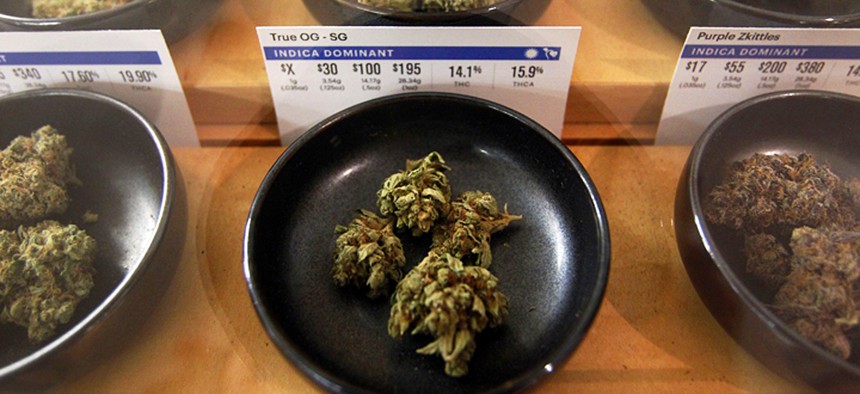Pennsylvania Governor Suggests Selling Marijuana Through State-Run Stores

This 2018 photo shows marijuana on display at a marijuana dispensary in Oakland, Calif. AP Photo/Mathew Sumner, File
Gov. Tom Wolf isn’t the first governor to recently float state-operated marijuana retail. Pennsylvania currently runs hundreds of wine and liquor shops.
Pennsylvania Gov. Tom Wolf on Tuesday proposed legalizing recreational marijuana and suggested having state-run pot shops to sell it to consumers, as he outlined plans for helping businesses recover from the economic crash caused by the coronavirus.
Wolf, a Democrat, said his proposal is to legalize recreational cannabis for people over 21 years-old. “I think we have a state store system that would be an ideal way to distribute it,” he said during a press conference presenting his fall legislative agenda. “I think it’s also a way that the state could actually get some tax revenue from something that people are evidently already doing,” he added.
Pennsylvania is among 17 states that exert direct control over alcohol sales within their borders. The state’s Liquor Control Board operates more than 600 Fine Wine & Good Spirits stores across Pennsylvania, according to the National Alcohol Beverage Control Association.
Adult recreational marijuana use is now legal in 11 states. But pot is typically grown, processed and sold by private businesses that are licensed and regulated by state and local authorities. The federal government continues to classify marijuana as an illegal drug.
The tiny town of North Bonneville, Washington drew attention in 2015 when it became the first local government in the country to open a municipally-owned marijuana shop.
Earlier this year, Rhode Island Gov. Gina Raimondo proposed the idea of state-owned marijuana shops as part of her budget proposal, but the legislature hasn’t approved the idea.
Wolf is calling for recreational marijuana revenue that the state collects to help fund grants for small businesses, with half of the money earmarked for historically disadvantaged firms. He is also proposing that some of the money go to “restorative justice” initiatives, focused on “repairing the harm done to crime victims and communities as a result of marijuana criminalization.”
The governor noted on Tuesday that he and Lt. Gov. John Fetterman urged state lawmakers last year to begin considering the possibility of legalizing recreational marijuana.
Fetterman took a tour around Pennsylvania to talk to people about expanding pot legalization in the state beyond medical marijuana. One takeaway, he said, was that people who favored recreational marijuana wanted to see it sold through a state store system.
The governor suggested that the hit the state’s budget has taken from the coronavirus could raise the level of interest among Republican lawmakers in taking up a recreational marijuana bill. “We’ve had a little more time to see what’s happened in places like Colorado with revenues,” he added. “This might be one way to plug a hole.”
Wolf signed a law in 2016 legalizing medical marijuana in the state.
He conceded that it would take time to get a system set up to regulate and sell recreational pot and emphasized that about $1 billion that has flowed to Pennsylvania under a federal coronavirus relief law would provide a main source of funding for a broad slate of economic recovery initiatives and other programs he outlined on Tuesday.
Pennsylvania House Majority Leader Kerry Benninghoff gave Wolf’s proposals a cool reception, criticizing the governor for not doing enough to work with lawmakers during the pandemic.
“It is disingenuous for this governor to put forward an unaffordable legislative agenda and require taxpayers to bail him out of his unilateral mandates that have devastated their lives and livelihoods,” the Republican legislator added in a statement.
Pennsylvania Auditor General Eugene DePasquale estimated in 2018 that the state could raise about $581 million a year in revenue by regulating and taxing marijuana. Pennsylvania’s general fund spending in recent years has been around $33 billion to $35 billion.
Bill Lucia is a senior reporter for Route Fifty and is based in Olympia, Washington.
NEXT STORY: Higher Rents Associated with Increase in Homelessness, Federal Watchdog Finds






